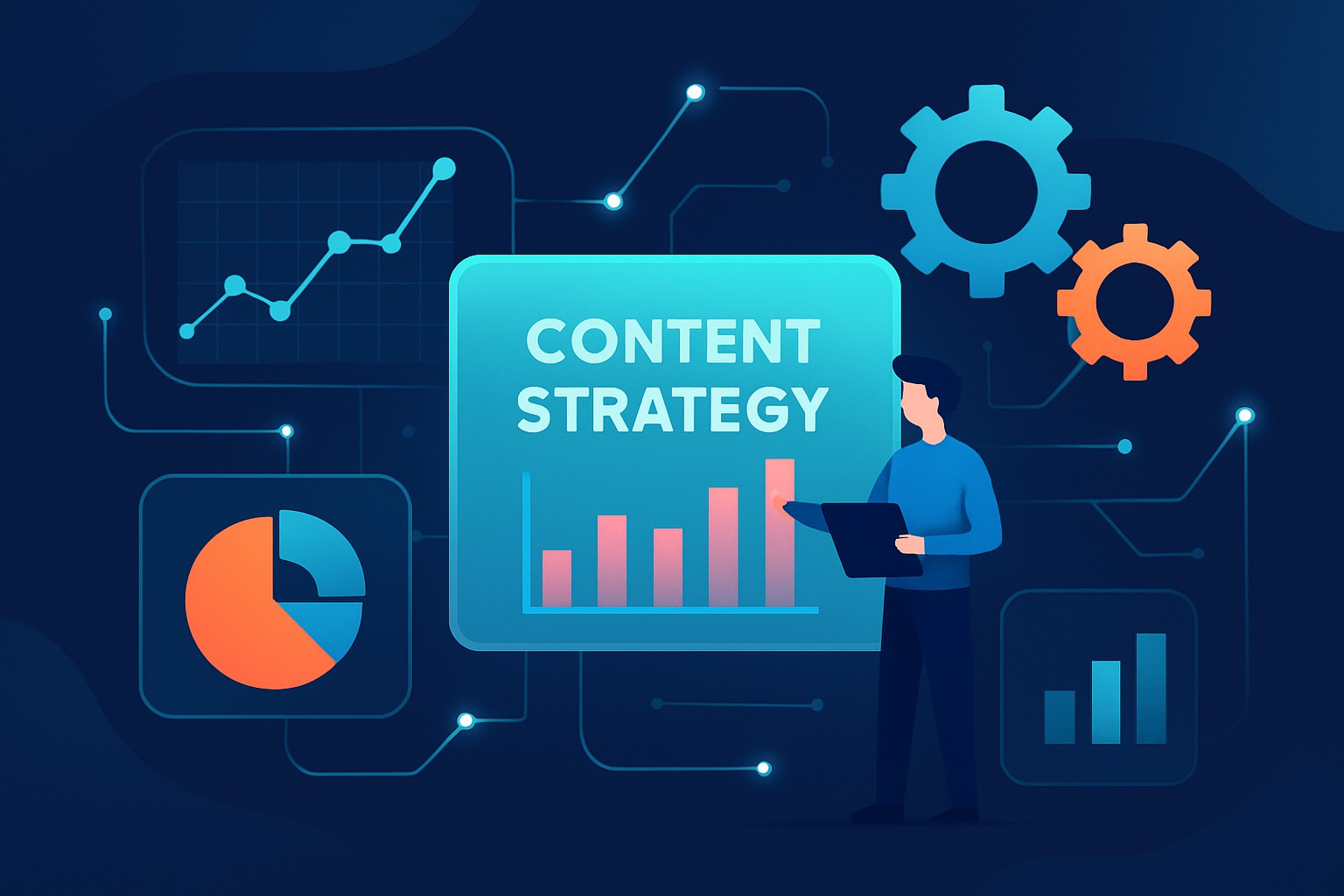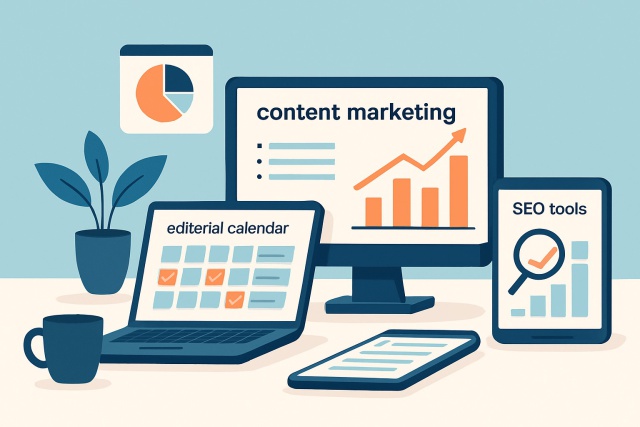
Best high paying investment affiliate program
Unlock top affiliate earnings in the investment niche by promoting high paying programs like Semrush...

Content marketing for tech companies brings unique challenges and big potential. It’s no walk in the park because of complex products and lightning-fast tech changes. The audience truly knows their stuff. Crafting and executing a content strategy that fits this fast-paced field is important for hitting clear business goals like generating qualified leads, building brand trust, educating customers and keeping them loyal for the long haul.
Content marketing for tech companies is all about crafting and sharing valuable and targeted content that helps prospects and customers understand complex technologies and solutions. Tech content walks a fine line between diving into technical details and keeping things clear. It aims to genuinely engage a savvy audience throughout what can often be a long multi-step buying journey.
Successful content marketing kicks off with setting clear and measurable goals that tie directly into your broader business objectives. Whether you’re aiming to reel in qualified leads, give your brand more shine, break down complex info for your audience or keep your customers coming back for more, having focused goals acts like your trusty compass.
Take a good hard look at your main business goals and figure out how content can help you hit those targets.
Dedicate solid time to digging into your target audience’s needs and pain points—getting inside their heads really pays off.
Set SMART (Specific Measurable Achievable Relevant Time-bound) goals that tie your content efforts directly to business results—no vague ambitions here.
Team up closely with sales and product people to ensure your messaging and timing are perfectly in tune because nobody likes mixed signals.
Pinpoint the key performance indicators (KPIs) that let you watch progress and tweak things as you move along—think of it like a GPS for your content journey.
Creating accurate buyer personas is a cornerstone in tech content marketing especially since user roles and decision-making processes can get tangled. Digging into thorough audience research shines a light on each persona's unique challenges and the information they’re hunting for and the content formats they actually respond to.
A solid content strategy covers different types of content and the channels used to share it. It also defines how often posts go out and organizes themes through topic clusters.
| Content Type | Lead Generation | Customer Education | Brand Trust | Retention |
|---|---|---|---|---|
| Blogs | ✓ | ✓ | ✓ | |
| Whitepapers | ✓ | ✓ | ||
| Case Studies | ✓ | ✓ | ||
| Webinars | ✓ | ✓ | ✓ | |
| Videos | ✓ | ✓ | ✓ | ✓ |
| Newsletters | ✓ | ✓ | ||
| Social Media | ✓ | ✓ |
Using topic clusters and pillar content grabs the spotlight in tech markets when it comes to boosting SEO and building authority. Pillar pages deliver a broad and well-rounded overview of key topics while cluster content zooms in on specific subtopics and keywords. This combo usually works wonders for user experience by keeping visitors hooked longer and gives search engines confidence that the site knows its stuff.
Effective SEO for tech content marketing usually calls for tailored strategies that truly fit the niche. This means diving into detailed keyword research that focuses on complex technical terms. It also involves fine-tuning the site’s structure with solid technical SEO and adding schema markup to help your search results catch the eye.

SEO dashboard highlighting keyword performance and backlink analysis tailored for tech content
Creating content that truly clicks with tech-savvy readers takes a delicate balancing act of accuracy and clarity with a dash of engagement. It shines brightest when tailored to each stage of the buyer's journey from the first spark of awareness to locking in the decision.
Work with subject matter experts to ensure the content stays accurate and trustworthy.
Tailor the content’s complexity to fit what each buyer persona knows and needs—no more, no less.
Bring in visuals and demos to turn head-scratching ideas into something easier to grasp.
Keep the writing clear and to the point, delivering value without smothering readers in jargon.
Make sure there are clear, relevant calls to action—little nudges that help prospects navigate the funnel.
Spreading content across a mix of channels is like casting a wider net—it helps tech companies reach more people and boost engagement. By using owned media, earned media, paid ads and clever partnerships, they deliver messages that really hit home with the right audience.
Keeping tabs on performance through key KPIs is the secret sauce for success in tech content marketing. Metrics like web traffic and time spent on a page give valuable insights into how well your content is holding up. Bounce rate, lead quality, conversion rates and their contribution to the sales pipeline also matter. When you mix these hard numbers with a dash of qualitative feedback it helps you fine-tune the strategy on the fly.
| Metric | Description |
|---|---|
| Traffic | The number of visits to content pages that come from organic search and referrals — basically, who’s dropping by and how often |
| Engagement | Metrics like how long visitors stick around on a page and how quickly they bounce off, giving a sense of how captivating the content really is |
| Lead Quality | A measure of just how well inbound leads sparked by content fit the ideal customer profile — quality over quantity, as they say |
| Conversion Rates | The percentage of visitors who take the plunge and complete desired actions like downloads or sign-ups — the proof in the pudding of content success |
| Pipeline Influence | The role content plays in nudging leads down the sales funnel, helping to turn interest into actual opportunities |
| Content ROI | The revenue brought in compared to what was invested in content marketing — essentially, keeping an eye on the bottom line with a wink |
| Customer Feedback | Responses from surveys and direct comments that shine a light on how relevant and effective the content is — the candid voices of your audience |
Technologies like Google Analytics and marketing automation tools offer detailed dashboards and insightful data that make performance analysis easier. SEO platforms such as Moz or Mangools provide keyword tracking, site audits, backlink monitoring, and user behavior metrics.
Top tech companies have proven how powerful strategic content marketing can be for driving business results. For example, a cloud software firm enjoyed a 65% boost in qualified inbound leads by hosting targeted educational webinars and sharing insightful case studies. Another SaaS provider set up a pillar-cluster blog strategy with SEO tools like Moz Pro which worked—pushing their organic site traffic up by more than 80% over a year and nudging their sales conversions in the right direction.
"The most effective tech content marketing is really where solid technical know-how meets a genuine understanding of the customer’s journey. It’s that sweet spot that usually builds trust and, let’s be honest, helps speed up those buying decisions like nothing else." – Content Marketing Expert
Tech companies often juggle tricky issues like maintaining top-notch content quality as innovation speeds ahead, bridging the gap between marketing and sales teams without missing a beat, and breaking down complex tech speak without watering down the message. On top of that, scaling production and figuring out the impact of content can really keep people on their toes.
Starting or improving content marketing for tech companies really calls for a clear, practical plan that ties together your business goals with what your audience genuinely needs—while squeezing the most out of your available resources.
Give your current content a thorough once-over to check how it’s performing and spot any gaps lurking under the surface.
Set crystal-clear measurable goals that tie back to your main business objectives—no vague hopes here.
Craft detailed buyer personas that capture different roles and their unique needs—it’s like knowing your audience’s secret handshake.
Put together a content strategy that covers topics, formats, channels and workflows so nothing falls through the cracks.
Produce well-polished, sharply focused content by tapping into your internal expertise and sticking to best practices proven to work.
Share and promote your content like a pro across your chosen channels—timing and targeting matter more than you might think.
Keep a close eye on results and be ready to tweak and improve based on fresh insights and ever-changing market winds.
15 articles published
As a trailblazer in the field of user experience design, Indira Chaudhari seamlessly integrates captivating storytelling with innovative technology, crafting immersive digital journeys that resonate with consumers on a profound level.
Read Pages
Unlock top affiliate earnings in the investment niche by promoting high paying programs like Semrush...

Master SEO with the best book on SEO tailored for beginners and pros alike. Explore top picks, exper...

Learn practical retail content marketing strategies designed to boost foot traffic. Discover how to...

Discover how publishers can harness content marketing strategies step-by-step to boost engagement, d...